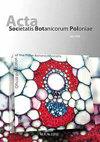体外培养和生物技术在波兰濒危国家植物物种保护中的应用
IF 0.8
4区 生物学
Q3 PLANT SCIENCES
引用次数: 0
摘要
在波兰,应用体外技术保护濒危国家植物物种的研究始于30年前。来自大约10个研究中心(包括大学、研究机构和植物园)的科学家们进行了迄今为止最重要的研究。本文综述了近几十年来在波兰40多种野生植物的微繁方面积累的知识和经验。本研究涵盖了蕨类植物、单子叶植物、双子叶植物和木本植物的所有类群。大多数研究集中在双子叶植物的纲和种,属于8个植物科。其中,首次研究了利用离体培养保护菊科濒危植物。已经建立了几种微繁方法,其中器官发生是植物繁殖中比体细胞胚胎发生更常用的形态发生途径。研究的主要方面包括选择合适的初始外植体和培养基组成的优化。建立了胚性细胞悬浮培养方法,并研究了获得人工种子的技术。一些研究已经扩展了植物对离体条件的适应。除了体外技术外,最近的研究还使用了分子生物学和遗传技术,这些技术可能支持波兰为保护濒危物种而开发的植物再生系统的实施。本文章由计算机程序翻译,如有差异,请以英文原文为准。
Application of in vitro culture and biotechnology for the protection of endangered national plant species in Poland
In Poland, research applying in vitro techniques to protect endangered national plant species began 30 years ago. Scientists from approximately 10 research centers comprising universities, research institutes, and botanical gardens, have conducted the most significant studies to date. In this paper, we review the knowledge and experience accumulated over the last few decades regarding the micropropagation of more than 40 wild Polish plant species. This research covered all groups of plants: ferns, monocotyledons, dicotyledons, and woody species. Most studies have focused on dicotyledon classes and species belonging to eight botanical families. Among them the first research was on the use of in vitro cultures for the protection of endangered plants of the Droseraceae family. Several micropropagation protocols have been established, in which organogenesis is a more frequently used morphogenetic pathway for plant propagation than somatic embryogenesis. The major aspects investigated included the selection of an appropriate initial explant and optimization of the medium composition. An embryogenic cell suspension culture was established, and a technology for obtaining artificial seeds was developed. Some studies have extended the acclimatization of plants to ex vitro conditions. Recent studies, apart from in vitro techniques, have also used molecular biology and genetic techniques, which may support the implementation of plant regeneration systems developed in Poland to protect endangered species.
求助全文
通过发布文献求助,成功后即可免费获取论文全文。
去求助
来源期刊
CiteScore
2.00
自引率
10.00%
发文量
18
审稿时长
1 months
期刊介绍:
The journal has been published since 1923 and offers Open Access publication of original research papers, short communications, and reviews in all areas of plant science, including evolution, ecology, genetics, plant structure and development, physiology and biochemistry.

 求助内容:
求助内容: 应助结果提醒方式:
应助结果提醒方式:


